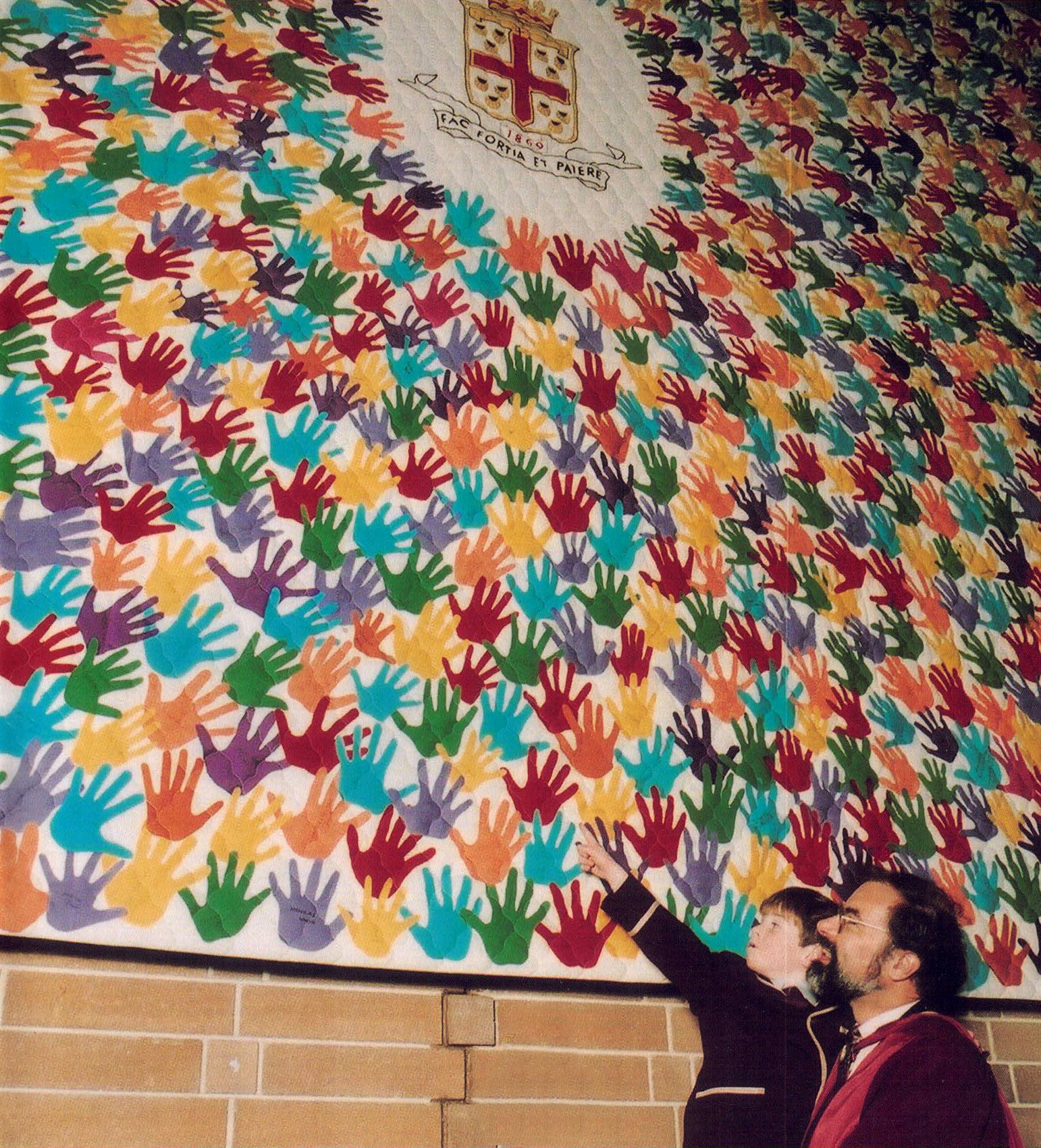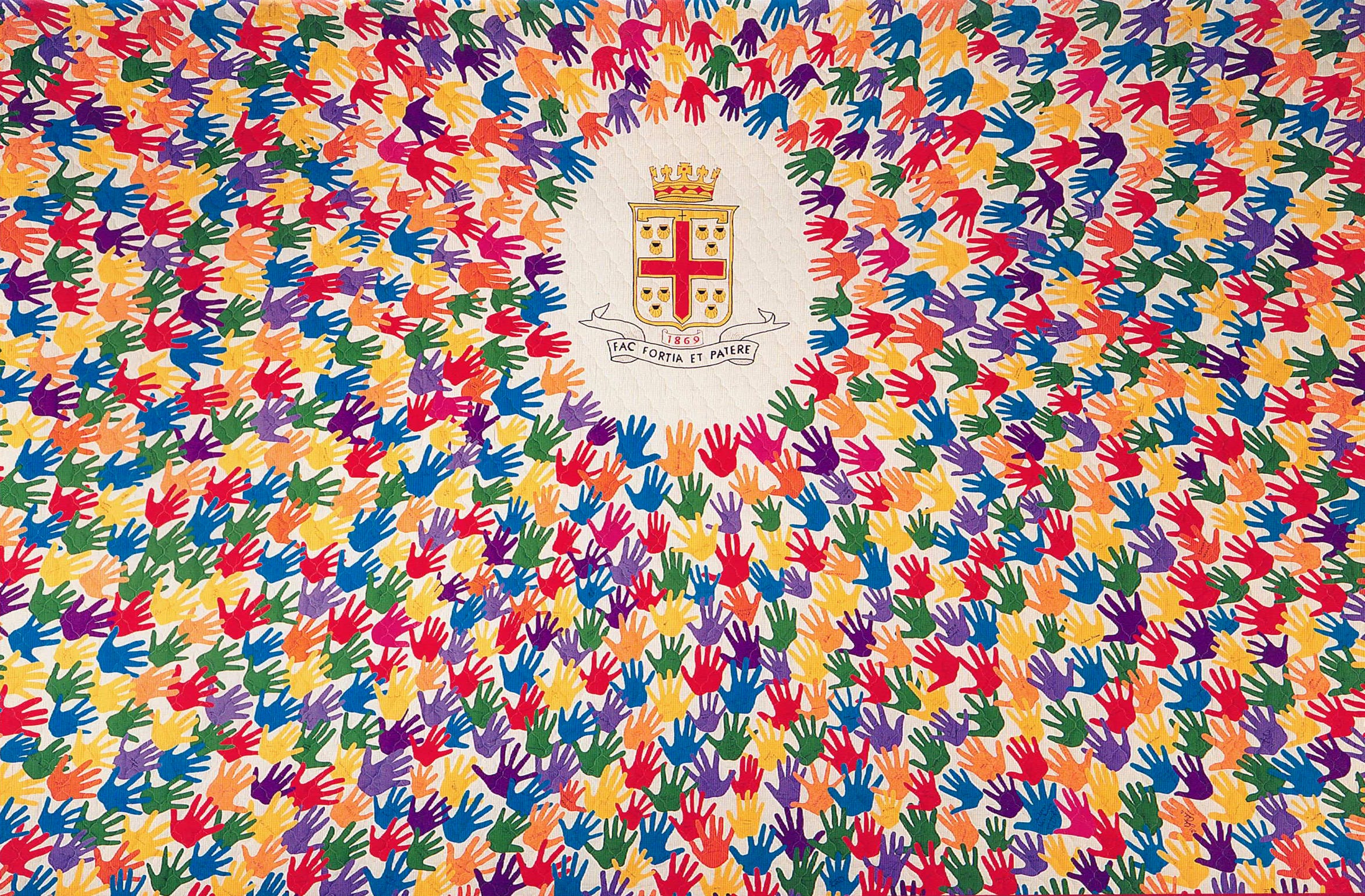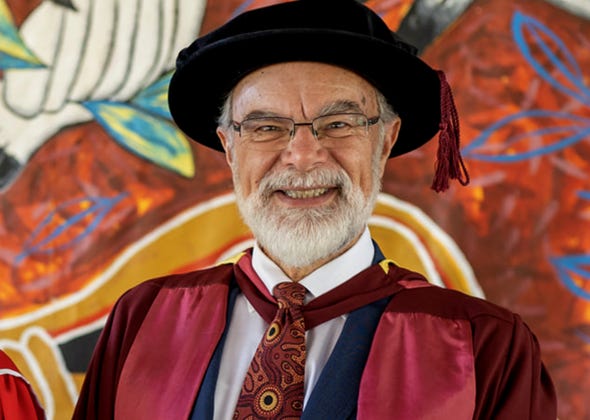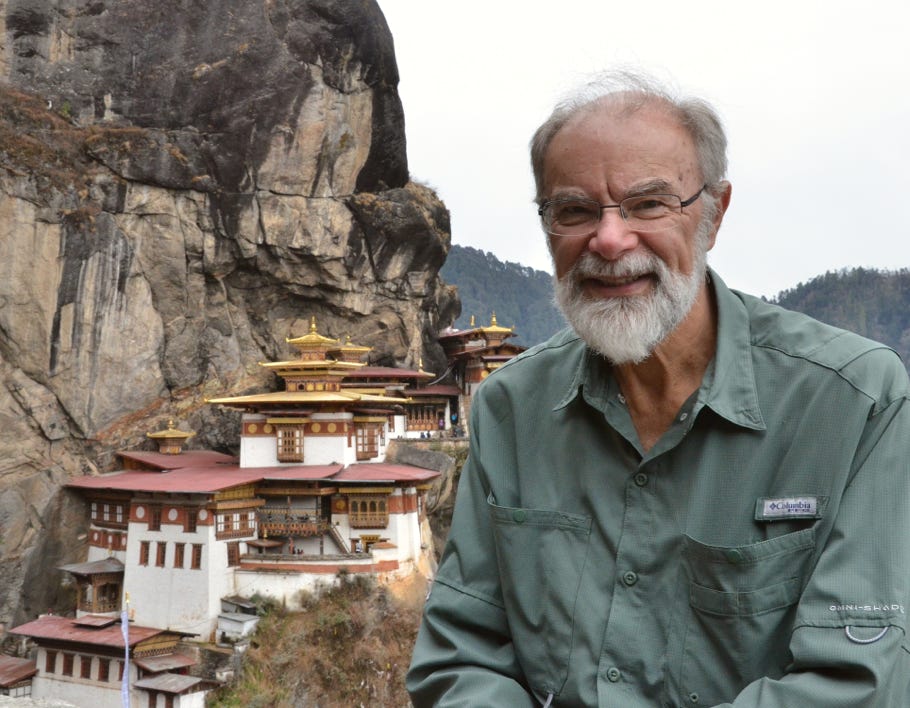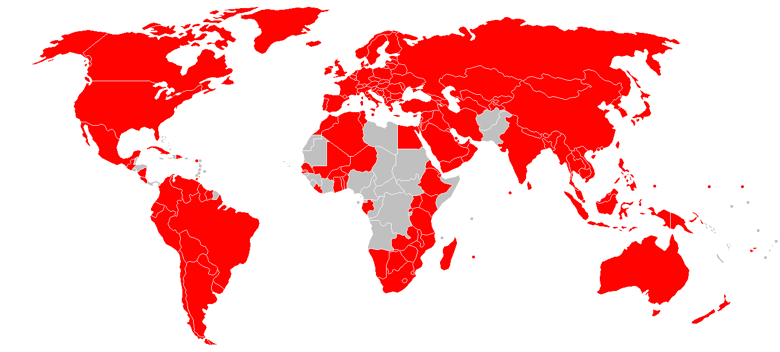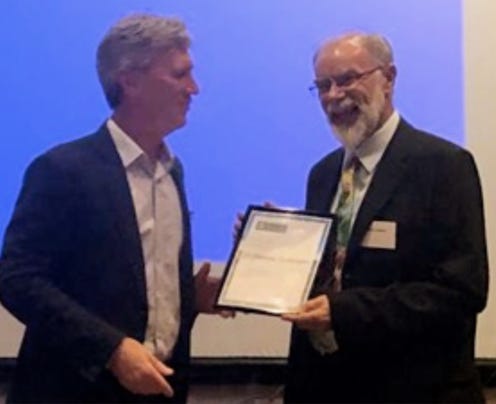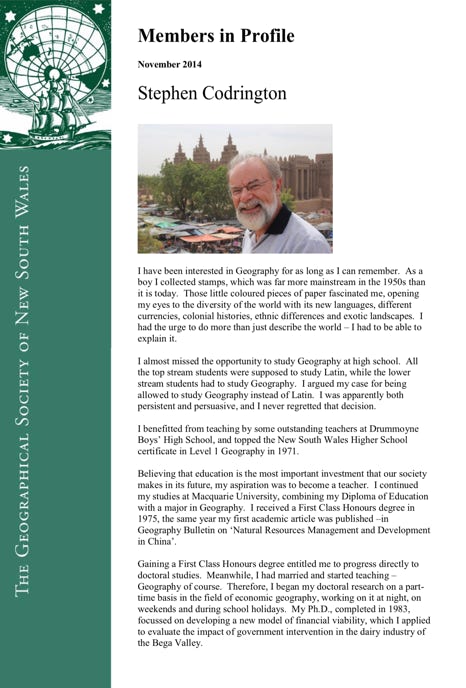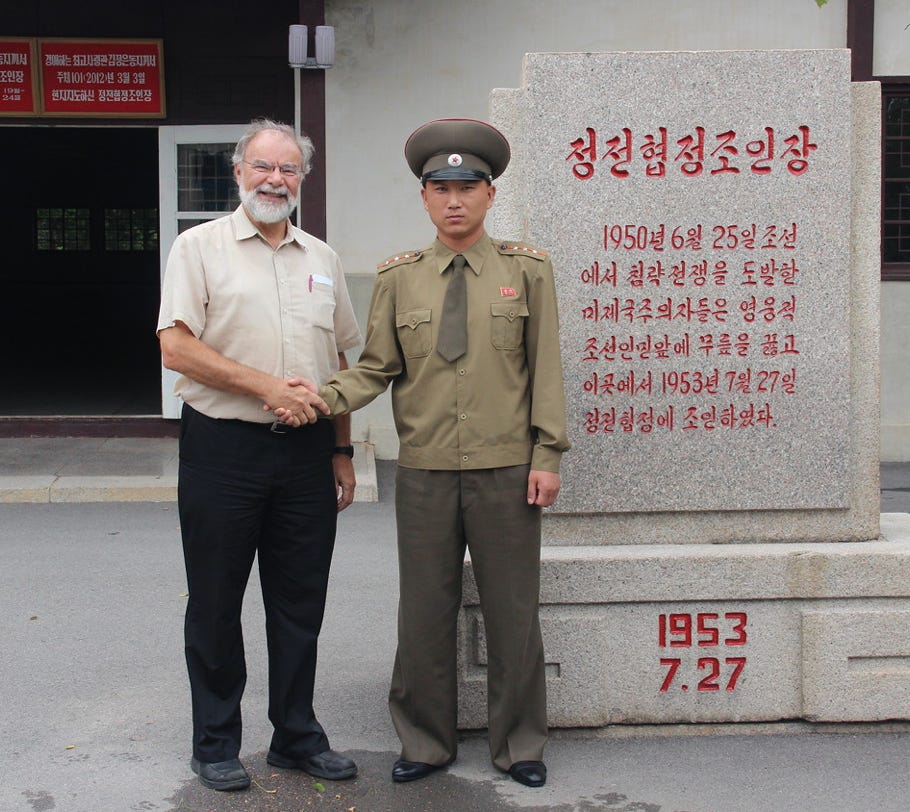Stephen Codrington is known internationally as a result of his career as the Head of five schools in four countries across three continents over 25 years, his authorship of some 70 books, his travel leadership and his public speaking.
Stephen provides support to school boards and leaders through Optimal School Governance, a focussed consultancy in school board effectiveness that he established in late 2014. Through his several roles, Stephen is thus fulfilling his passion to help form the next generation of young teachers, as well as assisting educational leaders and school boards in all parts of the world to improve the value they add through their management and governance processes, strategic planning, leadership dynamics, performance reviews, change management and operational effectiveness.
He is currently Chair of the board at Djarragun College, a non-denominational triple-campus independent college near Cairns, Queensland, that specialises in providing an excellent learning environment for Aboriginal and Torres Strait islander students from Prep to Year 12, both day and boarding.
Stephen is recognised globally as the author of 71 books, many of which are textbooks for Geography. His book ‘Planet Geography’, which was published in seven editions between 2002 and 2013, was expanded in 2017 into a set of 10 books to support the new International Baccalaureate (IB) Diploma Geography syllabus. These books are profusely illustrated with thousands of Stephen’s own photos, reflecting his keen hobby of photography, many of which were taken on his travels through the 168 countries he has now visited.
Originally published in 2002, Planet Geography was the first textbook written especially for IB Geography, and it is currently being used in 92 countries. Details of the book can be seen at www.planetgeographybooks.com. Another recent book, ‘Optimal School Governance’, is a ground-breaking practical handbook for members of school boards on effective governance, and the book supports Stephen’s work with school boards around the world.
Stephen’s academic backgrounds are Geography, Economics and Philosophy, and he is a former President of both the Geographical Society of New South Wales and the Geography Teachers' Association of New South Wales (twice). He is currently treasurer of the Geographical Society of New South Wales. He has led several successful geographical study tours to such diverse destinations as China, Myanmar, Russia, Estonia, Uzbekistan, Papua New Guinea, Indonesia (Irian Jaya), Thailand and North Korea. In 2005, he led a delegation of the first foreign students ever to visit North Korea - the first of nine trips he has now undertaken to that little-known and isolated country.
In 2014 to 2015, he worked in a part-time role teaching Geography at the Australian Catholic University, specialising in the fields of Environmental Sustainability and the Human Geography of Globalisation. From 2018 to 2022 he served as the Director of School Governance and Leadership Development, as well as Senior Lecturer, at Alphacrucis College, a Christian tertiary college with multiple campuses across Australia and New Zealand. Stephen’s work was focussed on the College’s main campus in Parramatta (Sydney, Australia), where he conducted research, professional development and school reviews, and taught both undergraduate and postgraduate courses in areas such as Critical Thinking, Educational Policy Development, Indigenous and Multicultural Education, Action Research, Geography, History and Religious Education. He continues to support Alphacrucis College by supervising several PhD students. He is also writing course material for the Masters of Educational Leadership program at Morling College and he serves as a mentor for school leaders with the Australian Council for Educational Leaders.
He has been honoured with election as a Fellow of the Australian College of Education, the Royal Geographical Society (UK), the International Biographical Association, and the Geographical Society of NSW, including both a Fellowship and Life Membership of the Geographical Society, as well as being elected a Member of the Order of International Fellowship. He is a former Chairman of H.I.C.E.S. (Heads of Independent Co-educational Schools) and a former Vice-President of A.E.C.S. (the Association of Executives of Christian Schools).
He edited Geography Bulletin, the journal of the Geography Teachers' Association of New South Wales from 1980 to 1986. He has been listed in Who’s Who in Australia every year since 2003.
From 1996 to 2001 he served as Deputy Chief Examiner in Geography for the International Baccalaureate (I.B.), setting examination papers for the I.B. and assisting with curriculum development. During his terms as Deputy Chief Examiner, he led many teachers' workshops in places such as Melbourne, Guangzhou, Singapore, Brisbane, Auckland, Adelaide, Hong Kong and Mumbai. In 2014, Stephen was appointed an IB Ambassador.
Stephen’s own formal school education was undertaken at Ryde Public School (1958-64), Denistone East Public School (1965) and Drummoyne Boys’ High School (1966-71). He represented the school as a member of the Open 1sts teams in Tennis and Debating, both activities providing many excellent opportunities to learn about the importance of humility in defeat. For the Higher School Certificate examination of 1971, Stephen studied English, French and Geography at Level 1, and Maths and Science at Level 2S. He topped the state in the Geography examination with a mark of 171 out of a possible 180.
He attained his Bachelor of Arts (with 1st class Honours) and Diploma of Education (B.A. (Hons), Dip.Ed.) from Macquarie University in 1976, and his Doctorate of Philosophy (Ph.D.) in Economic Geography in 1983, the title of his thesis being “The impact of government statutory marketing authorities on the viability of the liquid milk industry in the Bega Valley, 1975-76 to 1980-81”.
Stephen began his teaching career in 1977, and quickly advanced to the role of Departmental Chair of Geography at St Ignatius College, Riverview, a prestigious Jesuit boys’ school in Sydney, Australia. During his 12 years at Riverview, he undertook a one year teaching exchange at Stonyhurst College, another Jesuit school (in Lancashire, UK).
Stephen began his first headship at the age of just 35 when he accepted the invitation to become Principal at St Paul's Grammar School in Penrith (Sydney, Australia), commencing in January 1989. Stephen served at St Paul’s for eight years before he moved to New Zealand to take on the newly established role of Chief Executive at Kristin School in Auckland, New Zealand. Stephen returned to Australia three years later in January 2000 to serve as Headmaster at Prince Alfred College, one of the two grand, old, well-established boys’ schools in Adelaide (Australia). He worked in that role for five years before moving to Hong Kong to serve as Head of Li Po Chun United World College, a fully residential international school with students from over 80 countries where Stephen worked for seven years (from 2004 to 2011).
Some would argue that Stephen’s career as a Head of Schools reached its peak when he accepted the position as Head of The Awty International School in Houston, Texas, a complex school with more than 1500 students from about 60 countries, aged 3 to 18. With two sections, three schools and dual strands leading to the International Baccalaureate (IB) and the French Baccalauréat, Awty became both the largest international school campus in the US and the largest independent school in Houston during the period of Stephen’s leadership.
Details of Stephen’s achievements as an educational leader can be seen by clicking on the school logos to the right. Summaries of these popups appear on his LinkedIn profile here.
Throughout his time as a Head of School, Stephen chose to continue working as a classroom teacher of Geography and Theory of Knowledge, thus establishing a reputation for having a detailed working knowledge of classroom teachers’ everyday needs, excellent relationships with students, an up-to-date understanding of curriculum and a deep appreciation of the diversity within international education. In each of the schools where he has worked, Stephen was thus instrumental in implementing effective, positive - and often difficult - reforms as a change manager.
Stephen has a passionate interest in the geography, politics and culture of China. This interest has been expressed through his research and writings, and through some 80 visits there since 1982. From 1993 to 1995 he successfully negotiated to establish the first school in China since 1949 permitted to teach secondary students a course other than the government's national curriculum. This co-operative venture school (The Light of the World International School in Harbin) opened in March 1996, but sadly closed several years later. His interest in China continues, and in 2012 he established a sister school relationship between The Awty International School in Houston and Datong High School in Shanghai, having previously established successful ongoing sister school relationships between Datong and both St Paul’s Grammar School and Prince Alfred College during his headships.
Stephen has worked intensively in the area of best practice and change management in schools, and he has spoken widely on aspects of the subject in venues as diverse as Taipei, Geneva, Shanghai, Paris, Kampala, Freiburg, Washington DC, Adelaide, Bangkok and Invercargill.
Stephen has a strong commitment to excellence, cross-cultural understanding and internationalism in education. Echoing Aristotle, he believes “We are what we repeatedly do. Excellence, then, is not an act but a habit”. In all his work with schools, Stephen has followed the inspiration of Nelson Mandela who said “History will judge us by the difference we make in the everyday lives of children... Let us all resolve to put children at the centre of all we do. They must be the motivation for every decision we make. Because they are our future.”
When working in Hong Kong, Stephen established GCAT (the Global Concerns Action Team) in which he worked shoulder-to-shoulder with students to engage in many cutting edge service activities such as building the first toilets in a remote lepers’ village in the Himalayas and building three medical clinics in poor rural areas of Guizhou province, China. He believes that students should be encouraged to stretch themselves beyond their comfort zones in every area of their formation, and to go forth into the world as responsible, ethical and compassionate young men and women, committed to putting into practice the ideals of peace, internationalism, justice and excellence in all things.
An Australian by birth, Stephen was born on 27th July - the same date that is celebrated with fireworks and dancing every year in North Korea to mark signing of the Armistice to end the Korean War. The photo to the right shows him at a memorial to that great event (the armistice, not his birth!).
He is married to Dianne, and he has the best four children that any father could ever hope for! He is also a proud grandfather thirteen times over, an extraordinary achievement for someone who feels so young.
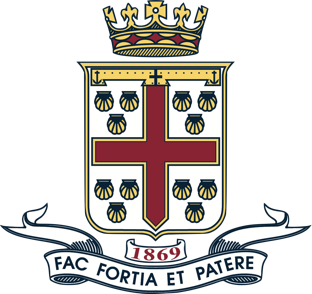
Headmaster
Prince Alfred College
Adelaide, Australia
January 2000 to July 2004
Stephen was appointed as Prince Alfred College’s 9th Headmaster in late 1998, commencing duties on the first day of 2000. While at Prince Alfred College, one of Australia's most famous boys' schools (established in 1869), Stephen oversaw a period of significant and rapid change (which some would say was long overdue). One of his first initiatives was to commission the Millenium Hanging, a massive quilted hanging for the Hall that symbolised unity by assembling the handprint and signature of every student and staff member in the school on 1st January 2000. He worked to build a strong relationship with PAOCA (Prince Alfred Old Collegians Association), attending almost every country and interstate reunion during his tenure as well as every one of the multiple reunions held in Adelaide. He oversaw three substantial building programs, upgraded classrooms (including introducing air conditioning), oversaw a complete re-fitting of the Hall with new seating, and played a pivotal role in developing the master plan which guided major campus redevelopment during the subsequent ten years. He diversified the staffing profile by appointing more young staff, including more women, and oversaw a growth in student enrolments of about 15%. The strong growth of enrolments resulted from the appointment of an excellent new director in the Admissions Office who was supported by innovative marketing campaigns that controversially included television advertising and posters on bus shelters. Stephen worked tirelessly to promote the College’s ethos as a Uniting Church school, including creating the new position of Youth Minister, through his weekly Newsletter articles, his public addresses and his weekly speeches at school assemblies. He promoted the school internationally, establishing a sister school relationship with Datong High School in Shanghai (China), personally recruiting several tens of students from China, and (less successfully) promoting the College at recruitment fairs in Russia and Eastern Europe. Throughout his time at Prince Alfred College, Stephen chose to stay in touch with his students and with his teachers’ daily needs by teaching full regular classes of Geography. Stephen developed and implemented a new Strategic Plan following extensive consultation, he developed a highly effective incentive awards program that stimulated student effort and achievement in the classroom, he established the Einstein Program to meet the needs of Gifted and Talented students, guided the formation of the Noel Baker Centre for School Mathematics, he saw every student individually in his office on their birthday, developed a gallery to promote the substantial achievements of alumni as role models to current students, coordinated a significant and overdue updating of the school uniform, and he developed and introduced the nationally-acclaimed, ground-breaking Eudemology program. This last innovation was one of several that led to the school being named one of “Australia’s Top 10 Schools” by 'The Australian' newspaper during three years of the five years that he was there, something that has not been repeated before or since. Upon leaving Prince Alfred College to take up a new headship in Hong Kong, Stephen donated a new trophy, the Wesley Cup, as a peak award for the restructured annual house competition, becoming the College’s first Headmaster since 1886 to leave in order to take up another position (as opposed to retiring).
A gallery of photos showing the College during Stephen’s headship can be seen HERE.

Principal
St Paul’s Grammar School
Sydney Australia
Jan 1989 to April 1997
Stephen came to St Paul’s when the school was six years old as its third Principal. Under Stephen’s eight years of headship, the school expanded from being a high school (Years 7-12) with 500 students into a full K-12 school with over 1200 students with the establishment of a Junior School on the campus (K-6). The Junior School quickly gained an impressive reputation for high standards and innovation, including compulsory teaching of Chinese language from Kindergarten to Year 6. To accommodate the expansion of student numbers Stephen guided six large building programs, two of which involved innovative and highly acclaimed adobe (mud-brick) construction. Stephen worked to build a strong, cohesive community in the school, including inviting each student to visit his office for an individual chat on their birthday, editing the 10th anniversary book “The First of Many Decades”, and writing the school’s first definitive statement of philosophy and educational principles, the book “Foundations”. He gained membership of the school in several significant peak ‘mainstream’ networking organisations including AHISA and HMC, and worked successfully to make St Paul’s a founding member of HICES. He introduced a Gifted and Talented program that included then-innovative practices including acceleration and vertical streaming. He demonstrated creativity, patience and negotiating skills by successfully negotiating and establishing a joint-venture branch of the school in Harbin (north-east China), a task that involved sorting through a myriad of legal, governmental and regulatory hurdles, as well as demonstrating a deep level of cultural sensitivity. Stephen also introduced the IB Diploma in 1990 – a bravely pioneering step way at the time as the IB was largely unknown in Australia at the time – St Paul’s was only the second IB school in New South Wales and the first in the state to offer examinations in the November session. Internationalism became a key feature of the school under Stephen’s leadership, supported by his establishment of sister school relationships with schools in China, Japan and Russia. With the support of the School Council, Stephen established the Development Office, bringing back Adrian Lamrock (the School’s Founding Principal) as its first director; Adrian subsequently raised significant sums for capital building projects as well as inaugurating annual school musical productions and starting the regular magazine “Futurum”. Also with the Council’s support, he established annual scholarships, and he played a strong role in the successful local campaign to reverse a government proposal to establish a huge rubbish tip just along the road from the school. Stephen is also especially remembered for his introduction of a system of student awards for effort that positively transformed the learning ethos of the student body. Throughout his time at St Paul’s, Stephen chose to stay in touch with his students and with his teachers’ daily needs by teaching full regular classes of Geography.
A gallery of photos showing the school during Stephen’s principalship can be seen HERE.
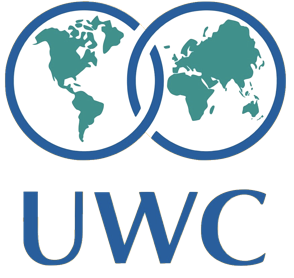
Principal
Li Po Chun United World College
Hong Kong, China
May 2004 to July 2011
Li Po Chun United World College is a senior international high school with 256 students from about 80 different countries. All students live on campus and study the IB Diploma Program. Stephen was appointed as the College’s third Principal. During the period of Stephen's headship, outstanding (i.e. world’s best) academic results were achieved that enabled students to enter the world’s top colleges and universities, many on full scholarships, including students from refugee and other socially and economically disadvantaged backgrounds. The College’s integration with the wider UWC movement and links with student selection committees around the world were strengthened by Stephen’s attendance at regional meetings, and this helped to expand scholarship opportunities, especially for students from the Middle East, Central Asia, Africa, Cambodia and the Philippines. Stephen established an educational goodwill initiative with North Korea that involved six visits by groups of students to the DPRK, he inaugurated an NGO-like service learning organisation called GCAT (the Global Concerns Action Team) and guided students through a program to overturn a severe case of official discrimination against a community of lepers in south-west China. He also coordinated a program that resulted in the construction of three medical clinics in poor, remote, rural villages in China’s Guizhou province, including in some cases, using his students’ own labour. He also led students on service trips to support AIDS-orphans in Phnom Penh, Cambodia. Throughout his time at LPCUWC, Stephen chose to stay in touch with his students and with his teachers’ daily needs by teaching full regular classes of Geography and/or Theory of Knowledge. On campus, Stephen oversaw a major building project to construct a new auditorium and performing arts centre. He also supervised the establishment and first years of operation of the Sino-Japan Youth Conference, a student-led international event that brought together about 70 young people each year from China and Japan on the campus in Hong Kong to discuss, debate and negotiate significant issues and tensions between the two nations. He and wife invited students to dinner in mixed groups of twelve in their home on campus on two occasions every week so that students could experience a fairly frequent home-like experience while attending boarding school far away from their own families and homes.
Two galleries of photos showing the College during Stephen’s headship can be seen HERE and HERE. Additional photos can be seen in Stephen’s blogs from LPCUWC from 2006 to 2011, which can be accessed through these links: 2006, 2007, 2008, 2009, 2010, 2011, and in the LPCUWC event galleries.

Chief Executive
Kristin School
Auckland, New Zealand
April 1997 to December 1999
Stephen was invited to Kristin School to oversee and implement a new ‘Three Schools” structure that the Board had decided to introduce to provide a scaleable management framework for the school’s future anticipated rapid growth. Establishing the new structure began with the appointment of a new senior leadership team – Principals of the Junior, Middle and Senior Schools, a Dean of School, a new Business Manager and an IT Manager. This process was immediately followed up by the development of a new Strategic Plan for the school – the school’s first such document which was designed to give direction for the school’s expansion over the coming ten-year period. For students, Stephen developed and introduced an innovative program to develop student leadership (especially through leadership camps), developed and implemented a new system of student effort awards, introduced the practice of inviting each student to visit him in his office on their birthdays, and coordinated the process of refining and updating the school uniforms. Throughout his time at Kristin, Stephen chose to stay in touch with his students and with his teachers’ daily needs by teaching full regular classes of Geography, and he even experienced life as a student. He also brought to fruition a building program to provide a new gymnasium for the Junior School. In early 1998, Kristin celebrated its 25th anniversary, which was a wonderful occasion that provided a great focus to help build a cohesive sense of community. Stephen worked tirelessly to promote Kristin internationally, developing links with schools in China and Japan, speaking at conferences in such diverse locations as Taipei, Kathmandu, Penang and Taupo, culminating in Kristin’s hosting of the 10th Annual Conference of AAIBS (Association of Australasian International Baccalaureate Schools) in mid-1999. Importantly, working behind the scenes Stephen helped steer the board through an intensive restructuring process to overcome some complex and sometimes contentious issues that threatened its viability, including researching best practice models of governance in a wide variety of schools and helping negotiate an entirely new set of by-laws. The new by-laws, board structure and board membership were introduced in mid-1999, with some commentators observing that these reforms “saved the school”.
A gallery of photos showing the school during Stephen’s headship can be seen HERE.

Head
The Awty International School
Houston, Texas, USA
July 2011 to July 2013
Stephen was invited by the Board to serve as Head of The Awty International School to advance its internationalism by implementing many of the measures he had introduced successfully at LPCUWC in Hong Kong. As Head of School (the CEO of the organisation), Stephen steered a period of significant growth during which Awty became the largest international school campus in the United States and the largest independent school in Houston (with 1500 students and 270 employees). Two major building programs were completed ahead of time and under budget. Faculty retention rates strengthened, reflecting improving staff morale, and the demand for student places rose sharply, reflecting a substantial growth in the school's reputation. A draft Strategic Vision was prepared after extensive community-wide consultation. A new framework for senior staff appraisal was developed and implemented. Transparency was improved, a BYOD scheme for students was introduced, the +Works program was introduced to strengthen the sense of community, and the old community service program was replaced by a Service Learning model. Personnel restructuring was implemented, including the new role of Sustainability Coordinator. 100% staff and faculty participation was achieved for the first time ever in the annual fund, the school achieved its best ever IB Diploma results, and Stephen personally negotiated and established a sister school relationship with a key school in Shanghai, China. Throughout his time at Awty, Stephen chose to stay in touch with his students and with his teachers’ daily needs by teaching full regular classes of Theory of Knowledge. After Stephen’s appointment (in 2010) but prior to his arrival (in 2011), Awty’s board entered a period of significant internal turmoil and instability, which required careful navigation on Stephen’s part to protect the students and staff. The experience of managing this turmoil provided Stephen with many of the insights he uses today in helping and supporting school boards though his consultancy work.
A gallery of photos showing Awty during the early phase of Stephen’s headship can be seen HERE. Additional photos can be seen in Stephen’s blogs from Awty from 2011 to 2013, which can be accessed through these links: 2011, 2012, 2013.

Teacher of Geography, Asian Studies and Religious Education, then Head of Geography
Saint Ignatius College,
Riverview, Sydney, Australia
1977 - 1988
Stephen was appointed to teach Geography, Asian Studies and Religious Education at Saint Ignatius College Riverview in April 1977, having taught briefly in the New South Wales state system at Seven Hills High School and Rooty Hill High School. He quickly advanced to the position of inaugural Head of Geography when the Social Sciences faculty was split into two in 1980 (the other part being Economics). As Head of Geography, Stephen raised the profile of Geography considerably in the school, establishing a dedicated teaching zone for the subject with an associated office and resource centre (the famous GRIC – Geography Resource Interaction Centre). Student numbers expanded substantially and the results in external examinations soared. As a strong advocate of fieldwork, Stephen established a system of field trips for each year group in the College, culminating in the annual three-day Bega Valley field trip for senior students. He expanded this concept further by initiating overseas field trips (study tours) for students – Papua New Guinea in 1983, Burma (via Singapore, Malaysia and Thailand) in 1984, and China (via Hong Kong) in 1985 and 1988. While Head of Geography, Stephen raised the College’s profile within geographical education circles through membership of the Councils of the Geography Teachers’ Association of New South Wales and the Geographical Society of New South Wales (including senior executive roles), through authorship of several very popular textbooks, by chairing the committee that set and administered the annual Catholic Secondary Schools Association trial Higher School Certificate examinations, and through his membership of the Geography Syllabus Committee of the New South Wales Board of Senior School Studies (re-named Board of Secondary Education in 1987 and Board of Studies in 1990). For Co-curricular involvement at Riverview, Stephen began by coaching the 13I Rugby Union team, advancing to coach the 15G Rugby team before being slotted into more suitable and successful roles coaching Tennis and Debating.
Dr Stephen Codrington
B.A. (Hons), Dip.Ed., Ph.D.
F.A.C.E., F.G.S.N., F.N.G.T.A., F.R.G.S.
Educator • Consultant • Geographer • Author
DETAILED BIOGRAPHY
“As for me, I am tormented with an everlasting itch for things remote. I love to sail forbidden seas, and land on barbarous coasts.” - Herman Melville, ‘Moby Dick’
I am a geographer and I love to travel to experience new places, new cultures, new ideas, new environments and new foods. I really enjoy understanding our world more deeply through first-hand experiences. On this page, I have recorded a few of my travel diaries to share with you.


2003 • 2004 • 2005 • 2006 • 2007 • 2008 • 2009 • 2010 • 2011 • 2012 • 2013 • 2014 • 2015 • 2016 • 2017 • 2018 • 2019 • 2020 • 2021 • 2022 (N.B. 2022 was the last year of publication)




Summary of achievements in schools before becoming Principal
Click on each logo for details

Summary of achievements as a Head of five Schools (and founder of one more)
Click on each logo for details
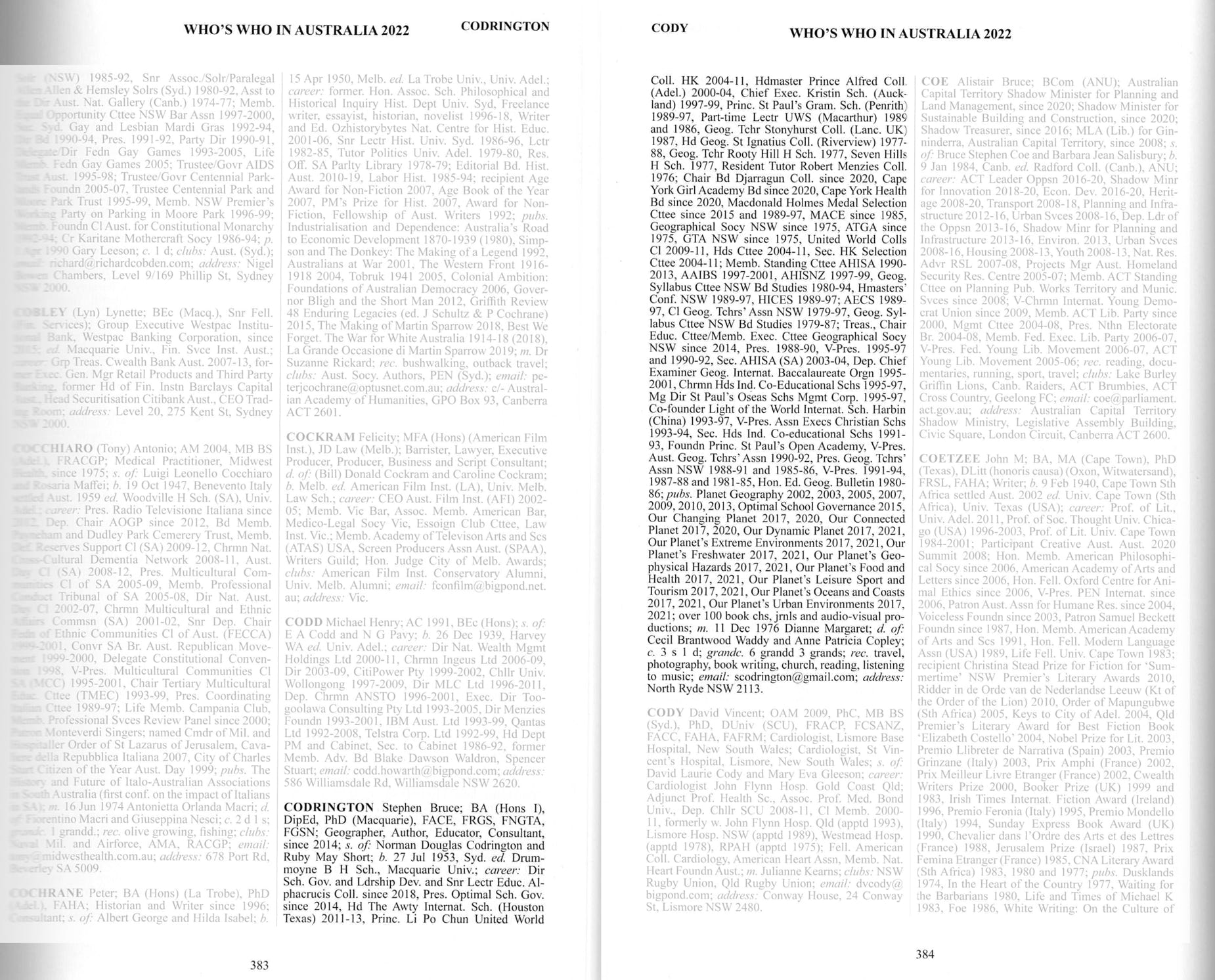
Note that this edition of “Who’s Who in Australia”, being the the 58th edition that was published in 2022, was the final edition as this seminal book ceased publication in that year after 122 years.
